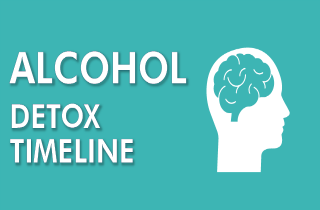Onset of alcohol withdrawal usually begins 6–24 hours after the last drink. But what can you expect in terms of moderate alcohol withdrawal symptoms vs. severe symptoms and their duration? We review here, and invite your questions, comments, or feedback at the end.
Alcohol detox duration and length
Alcohol withdrawal symptoms: how long? The duration, length, and severity of alcohol detox all depend on personal factors such as: level of alcohol dependence, personal health, age, gender, etc. However, some general principles exist during alcohol detox, as well. For less severe cases of alcohol dependence, detoxification from alcohol is usually brief, and ends after 2–3 days without treatment. Infrequently, detox may continue for up to 14 days.
How long after your last drink do symptoms of alcohol detox begin? Detox can occur when the blood alcohol level is decreasing, even if a person is still intoxicated. Onset of alcohol detox is usually 6–24 hours after the last drink. Consuming opiates or sedatives may delay the start of detox process.
Alcohol detox timeline and schedule
Alcohol detox duration commonly lasts from around 5-14 days depending on how long the patient has been drinking. This is depends by many factors. The severity of alcohol detoxs also is determined on the number of drinks per day, the total number and severity of past withdrawal episodes, usage of sedative drugs, and the number of health problems.
First stage: 0—72 hours
When does alcohol detox start? Between 0—72 hours of an alcohol detox, general symptoms may occur. Initial symptoms include tremor, anxiety, insomnia, restlessness, and nausea. These symptoms usually subside without treatment after a few days in people only mildly dependent on alcohol. However, more serious withdrawal symptoms occur in approximately 10% of people going through alcohol detox. These symptoms can include:
- fever
- increased blood pressure
- increased body temperature
- increased breathing rate
- increased pulse
- profuse sweating
- rapid breathing
- seizure
- tremors
In cases of severe alcohol dependency, severe symptoms begin to manifest early on. Convulsion attacks or seizures usually start early in the detox process, around 7-24 hours after the last drink of alcohol, and do not always occur in a single episode. Seizures may manifest in people of any age and are followed by muscle contractions and possible loss of consciousness. People with a previous history of severe alcohol withdrawal should be observed regularly during this time.
Second stage: 2—5 days
During the first week of alcohol detox, other forms of severe symptoms may occur, including delirium tremens (“the DTs”). Delirium tremens is the most severe form of alcohol detox syndrome, and medical intervention is needed. It usually develops 2–5 days after stopping or considerably reducing alcohol consumption. This state of the body includes severe symptoms, extreme restlessness or agitation, autonomic instability, gross tremor, confusion and disorientation paranoid ideation, hallucinations (any senses). Its mild symptoms are: nervousness, shakiness depression, mood swings, nightmares, not thinking clearly.
How long to detox from alcohol?
Alcohol detox duration typically lasts from 5-14 days but symptoms can persist for weeks or months after detox, depending on how long the patient has been drinking and the stage of alcoholism. In fact, some people may experience continued fatigue, insomnia, mood instability, reduced sexual interest, and hostility for weeks after their last drink. This subset of symptoms are called “protracted/post-acute” withdrawal symptoms (PAWS).
Acute symptoms of withdrawal occur at the beginning of the detoxification period, and they last for about 2 weeks. After this period, people may experience protracted withdrawal symptoms that last for a considerable period of time. Medical research indicates that a protracted withdrawal syndrome may develop following acute withdrawal and may persist for at least 1 year after your last drink. Common PAWS symptoms include:
- anxiety
- decreased energy
- decreased metabolism
- depression
- hostility
- reduced sexual interest
- sleep disruption
- tremors
Alcohol detox scheduling questions
Get Personalized Addiction Treatment Text Support
Receive 24/7 text support right away and at your convenience. There is no obligation to enter treatment and you can opt out at any time.
- Resources about addiction and recovery
- Information about our treatment process









Related Posts